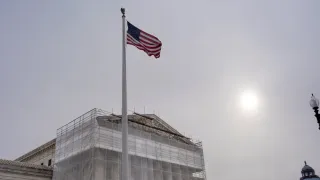March 14, 2023
Michael Tilson Thomas Conducts Mahler's Sixth Symphony
Philip Campbell READ TIME: 3 MIN.
The remarkable nexus between Gustav Mahler's intense Symphony No. 6, the San Francisco Symphony and Music Director Laureate Michael Tilson Thomas has captivated listeners, both at home and on tour, for many years. Whether by coincidence or design, previous concerts have also frequently corresponded with significant world events and SFS milestones.
At the end of March, Thomas returns to Davies Symphony Hall for three evening performances and an open morning rehearsal to explore again the spiritual transcendence of the Sixth, often called 'Tragic' symphony. For the first time since shortly before the pandemic lockdown of Davies Symphony Hall and the cancellation of a scheduled European tour, Mahler's towering masterpiece with its famous "hammer blows of fate" in the finale resounds live once more, the way it should be heard.
The fearless maestro is making the most of his Indian summer resurgence
after a brain cancer diagnosis and surgery. It seems characteristic of him, if a little worrying for us, that he is tackling such a daunting and physically demanding task at this late point in his career. If his husband Joshua Robison does not object, we will look forward guilt-free to the upcoming visit. When Thomas was last here in late January, his walk to the podium prompted a prolonged standing ovation. Warm wishes can equate with good medicine.
Mahler wrote the massive Symphony No. 6 in A minor during a relatively happy period in his own life, but still agonized over its reception and was reportedly highly anxious, even tearful backstage at the premiere. Called the greatest symphonist after Beethoven, and sometimes the greatest composer of symphonies ever, Mahler has come to define modern music, the transition between musical eras, and perhaps, the best exemplar of what a symphony is supposed to be.
He thought the symphony should embrace the world, and if he really meant universe, the 'Tragic' Sixth certainly exhibits his endlessly fascinating, sometimes pessimistic philosophy, with deep insights into the very meaning of life (or lack thereof).
Critics and listeners have sometimes complained the piece does not offer hope and that Mahler's vision was unrelentingly bleak. Many others, including generations of appreciative musicians and audiences (including myself) disagree. It may be convoluted and end in silent darkness, but "It's a sheltering darkness, one that peculiarly enough offers refuge," says Music Aeterna conductor Teodor Currentzis. It also contains some of the most thrilling theatrical moments in classical music.
Thomas has made his own highly quotable observations over the years. Almost three decades ago he called the Sixth, "the symphony I am most afraid of" and, "I find it both wonderful and nearly unbearable." Strong words from an artist who admits to an "obsessional thing" for the score.
Despite the challenges, he keeps going back to find more understanding. One of his opinions has remained constant; we can listen to the music and know we are not alone in tragic times. Music has a healing power that communicates universal empathy.
This was memorably apparent in the grim, sobering days following 9/11 when Thomas and the SF Symphony performed the Sixth for stunned audiences lost in grief and contemplation. The profoundly moving experience provided a necessary group ritual that transcended tragedy. It was a moment of ethereal solace we can still use today.
Thomas has never expressed which Mahler Symphony is his favorite, though he comments most lovingly about the Ninth. I suspect his favorite may be whichever one he is working on. 25 years on the podium and the historic legacy of The San Francisco Symphony Mahler Recording Project on SF Symphony Media testify to his commitment. He first conducted the Symphony in 1974, leading Gustav Mahler's Ninth.
My favorite Mahler symphony is whichever one I am listening to, though I confess, like Thomas, to having something of an "obsessional thing" for the Sixth.
Michael Tilson Thomas conducts Mahler's Sixth Symphony at Davies Symphony Hall, 201 Van Ness Ave. Open Rehearsal, March 30 10am, $30-$40. Performances March 30-April 1, 7:30pm. $35 to $165. (415) 864-6000 www.sfsymphony.org
Help keep the Bay Area Reporter going in these tough times. To support local, independent, LGBTQ journalism, consider becoming a BAR member.






